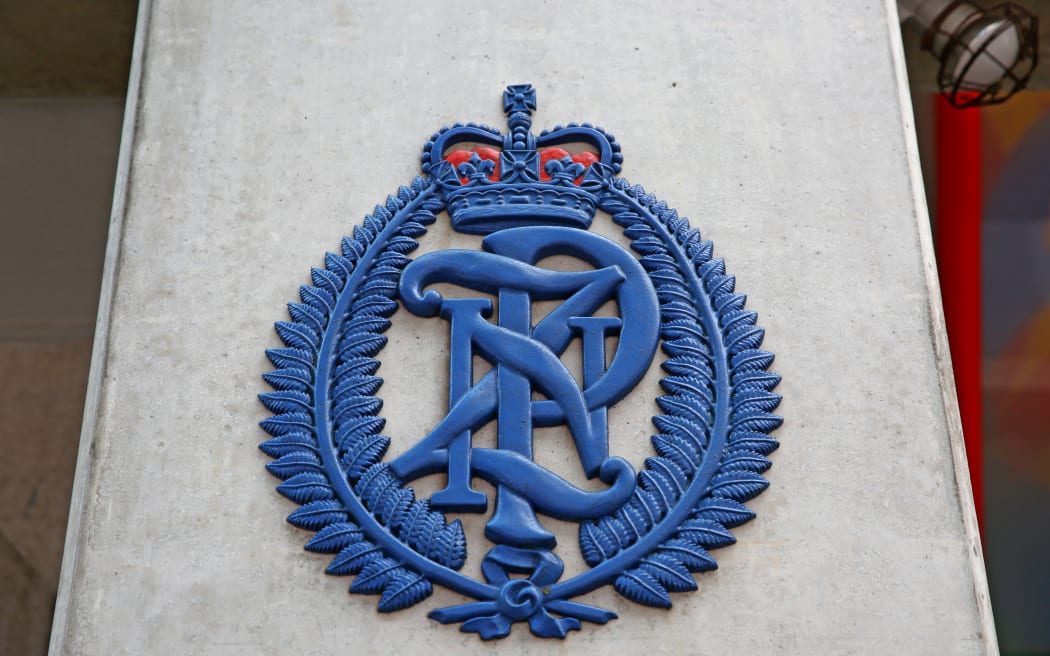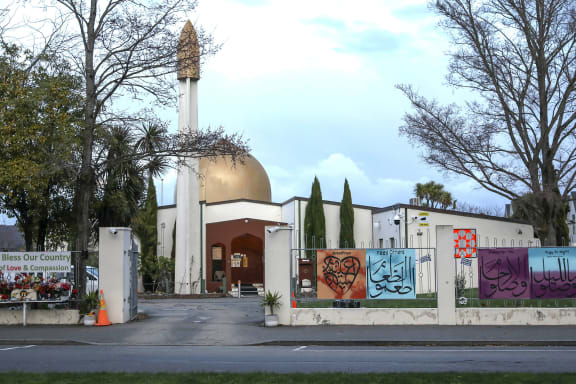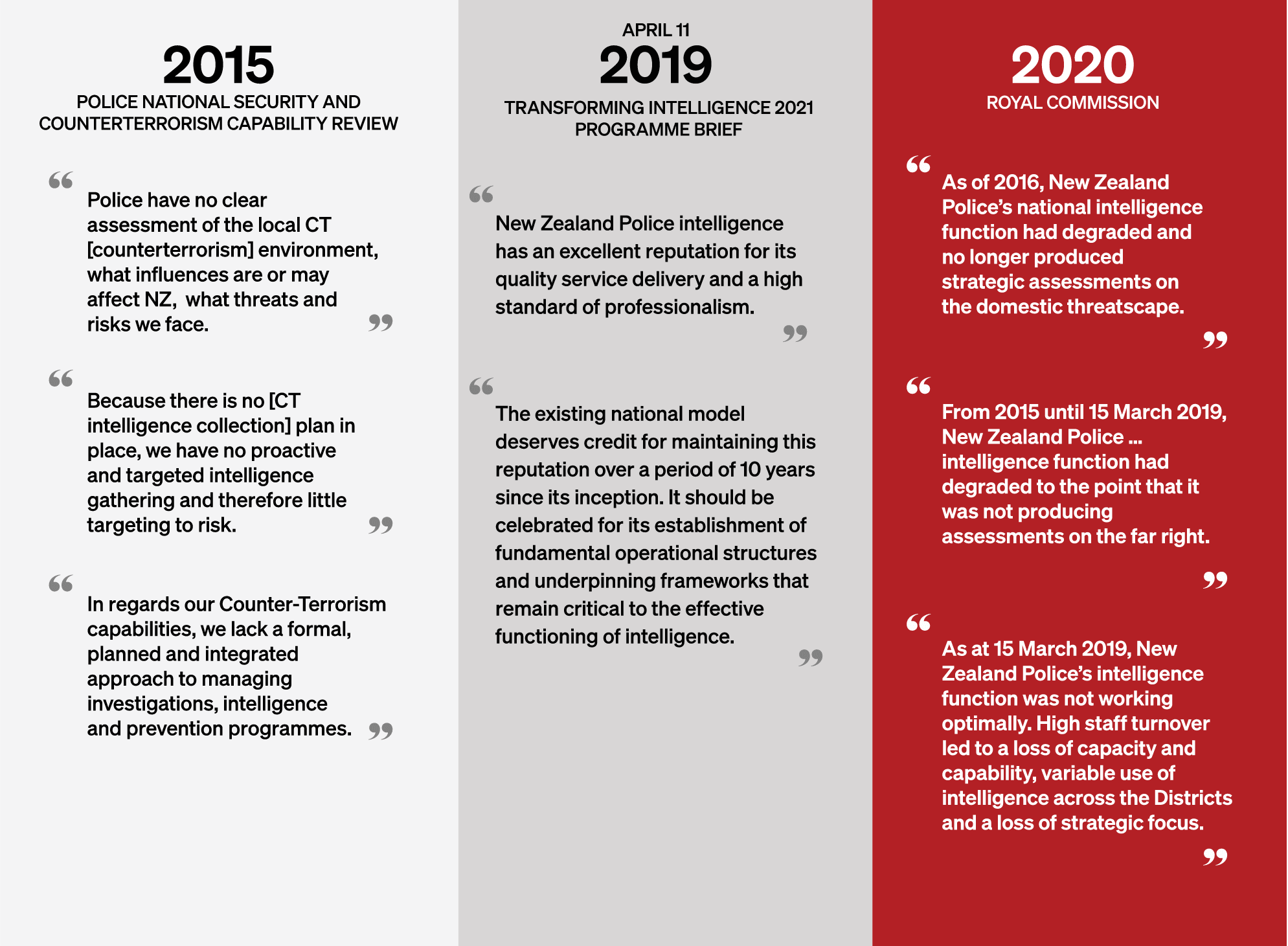Police were lauding their counterterrorism intelligence system shortly after the mosque attacks, even though they knew parts of it were in a woeful state.

Police did not review their performance in the lead-up to the mosque attacks, instead they fed into the Royal Commission of Inquiry. File photo Photo: RNZ / Alexander Robertson
In April 2019, a month after 51 people were killed, the national intelligence manager said the system's effectiveness over the past decade "deserves credit" and should be "celebrated".
But police knew the intelligence section was haemorrhaging staff and had been panned in internal reviews - and even now has major problems, according to documents released under the Official Information Act (OIA).
The intelligence problems are laid out in internal reviews in 2011, 2015, 2018 and 2020, across more than 170 pages outlining the shortcomings and the force's ongoing attempt to overhaul intelligence gathering and analysis.
In 2011 there was no national security plan, no communications plan for public, no coordinated databases, and lack of agreed processes.
By 2015, little had changed, except to get worse as 500 staff quit between 2011 and 2016.
Low pay and high staff turnover continued up to at least a few months ago.
"There is huge variance in capability and experience across intelligence," said a July 2020 review.
"The intelligence function has lost relevance within some areas of police due to a move away from tactical and operational intelligence."
Read the 2015 police report here

The Royal Commission of Inquiry into the mosque attacks described police counterterrorism intelligence capabilities as "degraded". Photo: AFP
Police did not review their performance in the lead-up to the mosque attacks, unlike the Security Intelligence Service (SIS), which did a rapid internal review after 15 March.
Instead, police fed into the Royal Commission of Inquiry, which took almost two years to report back.
The commission in late 2020 described police counterterrorism intelligence capabilities as "degraded" - not just once, but six times.
However, it also said no one agency dropped the ball over the terror attacks, and the government agreed.
Some Muslim community leaders have protested no one has been held to account for the systemic failings identified.
Praise for 'success'
Police praised their existing national system both sides of the mosque attacks.
In November 2018, top leaders launched an overhaul of the intelligence system, saying that "continuous and dedicated maintenance ... has been key to its success to date".
This was vital to the police mission goal of "being the safest country", the leadership paper said.
In April 2019, the national intelligence manager repeated the praise, in what appears to be a cut-and-paste job from November 2018 despite the intervening massacre, which they refer to just once in a 27-page document:
"After almost 10 years we should challenge and test if the [national intelligence] model is still fit for purpose.
"There have been a number of significant changes in our operating environment since 2008, including the event in Christchurch last month."
By December 2019 "we will have evaluated our work with full appreciation of our effort and impact", they added.

Chart: RNZ/Vinay Ranchhod
Yet police executives already knew the National Intelligence Centre and district intelligence units had a welter of problems.
A November 2018 document lists:
- "Underinvestment" in collecting information
- "Known gaps in training and skills development"
- "Duplication" of work
- Staff quitting at a rate of almost 30 percent a year - three times the public sector average
- Districts losing field officers due to "cost saving"
- Not enough senior experienced staff to mentor juniors
'Rudimentary level'
The leadership and national intelligence manager were talking about the whole system - covering not just counter-terrorism but the likes of drug crime, family harm, road crashes, sex assault and so on.
The shortcomings found in the 2018 and 2020 reviews are with the whole system; the 2011 and 2015 reviews, focused on national security and counterterrorism capabilities, had identified many of the same shortcomings and made recommendations to fix them, but this was not done.
"The organisation lacks a formal, planned and integrated approach to national security," the 2011 review said.
Police districts reported getting "little information on national security issues" from police headquarters.
There was "no clear lead to counter radicalisation in communities," it said.
"There is much duplication of effort."
Four years on, the 2015 review said: "Very little if any real progress has been made in most areas affecting national security" since 2011.
"Capabilities are at a rudimentary level," it said, echoing 2011's review.
It found most officers did not even know who was in charge.
It foresaw the districts losing still further national security intelligence capability due to budget pressures.
The Royal Commission of Inquiry in its findings said things got even worse after 2015.
"New Zealand Police's strategic intelligence capability declined after 2014," it said in December 2020.
"There was limited strategic focus on counter-terrorism from the intelligence system.
"The National Intelligence Centre did not produce many strategic products on counter-terrorism to inform national and district priorities.
"This, combined with the lack of capacity in district-level collections activity, meant that collection staff were not collecting information that would help to build a picture of the domestic extremist environment."
'Extremely high' staff turnover
The Royal Commission said police launched the overhaul in 2018 - called Transforming Intelligence 2021, or Ti21 - "in acknowledgement that the capacity and capability of their intelligence function had degraded".
However, the senior leadership team paper of late 2018 does not say much about these shortcomings, though it does note that attrition of numbers and expertise was "extremely high and is directly impacting the ability to deliver our service".
At this stage, they realised they needed a dedicated Internet search team, though it took till well after the mosque attacks - October 2019 - to set one up, as reported by RNZ yesterday.
Police in a statement to RNZ said Ti21 was "the vehicle for transforming police intelligence and has achieved a number of milestones to date".
They listed:
- A dedicated Internet (or Open Source Intelligence) team set up
- Restructure of the National Intelligence Centre
- "Significant" strengthening of intelligence leadership and management structures
- Deployment of a National Security Portal to manage national security persons of interest
- National Intelligence Operating Model set up
- Better intelligence support for "major events"
- Nationally standardised intelligence products brought in to improve quality assurance
Police faced a huge workload after the attacks. For instance, it was reported almost 2000 people were identified to police as potential risks to public safety in the six months afterwards.
The Security Intelligence Service (SIS) also had a "severely" degraded intelligence system up till 2016, when massive extra spending began, according to the Royal Commission.
The overhaul aims to recruit to plug holes in the 500-strong intelligence section, at national and district level.
Most of the overhaul process has been done not by staff, but by private consultants who took home 70 percent of the $800,000 spent on the intelligence project in the last two years.
This was 28 percent under budget. The process did not employ new staff or get new funding.
From June 2020, the overhaul did away with contractor use, and instead was being run by a new six-person National Intelligence Centre leadership team, that includes three hires from outside police, with the aim to finish this coming December.






